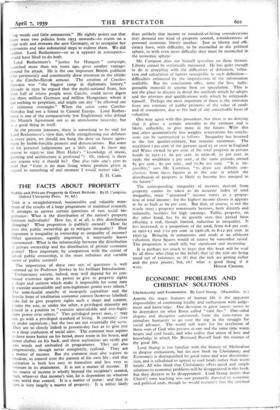THE FACTS ABOUT PROPERTY
Public and Private Property in Great Britain. By H. Campion. (Oxford University Press. 8s. 6d.)
Tinsis a straightforward, businesslike and valuable state- ment of the results of a large programme of statistical research. It attempts to answer certain questions of vast social im- portance: What is the distribution of the nation's property between individuals? How far, if at all, is this distribution changing? What proportion is publicly owned? How far does this public ownership go to mitigate inequality? How important is inequality in ownership to inequality of income? Other questions, equally important, it necessarily leaves unanswered: What is the relationship between the distribution of private ownership and the distribution of private economic power? How important, by comparison with the extent of actual public ownership, is the more nebulous and variable factor of public control?
The importance of these two sets of questions is well 'ummed up by Professor Jewkes in his brilliant Introduction: " Evolutionary society, indeed, may well depend for its con- tinued existence upon its power to give to property rights a shape and content which make it impossible for some men to exercise unassailable and non-legitimate power over others." The semi-feudal anarchy of monopoly capitalism and the Servile State of totalitarian economic control (however labelled) alike fail to give property rights such a shape and content. Under the one, as under the other, a privileged minority are placed in a position to " exercise unassailable and non-legiti- mate power over others." This privileged power may, c- may not, go with a privileged standard of living. It certainly does so under capitalism ; but the two are not essentially the same. They are so closely linked in present-day fact as to give rise to a deep confusion of social aims. The common man aspires to have more butter on his bread, more room in his house, and better clothes on his back, and these aspirations are easily put Into words and embodied in programmes. They are also Progressively, though never completely, realised. They are a matter of income. But the common man also aspires to freedom, to control over the pattern of his own life ; and that aspiration is both less easy to formulate and less easy to measure in its attainment. It is not a matter bf income. If the source of income is wholly beyond the recipient's control, Then, whatever that income's size, he is dependent on whoever does wield that control. It is a matter of status : and that in turn is very largely a matter of property. It is rather likely
than unlikely that income or standard-of-living considerations may demand one kind of property control, considerations of personal economic liberty another. Just as liberty and effi- ciency have, with difficulty, to be reconciled in the political sphere, so with even more difficulty they must be reconciled in the economic sphere.
Mr. Campion does not himself speculate on these themes. Liberty cannot be statistically measured. He has quite enough to do in grappling with the difficulties of definition, valua- tion and calculation of factors susceptible to such definition— difficulties enhanced by the imperfection of the information available. But his conclusions offer, none the less, indis- pensable material to anyone bent on speculation. This is not the place to discuss in detail the methods which he adopts and the provisos and qualifications with which he safeguards himself. Perhaps the most important of these is the omission from any estimate of public property of the value of roads and of armaments, due to the lack of any conceivable basis of valuation.
One may agree with this procedure, but there is no denying that it gives a certain unreality to the estimate and is likely, unluckily, to give more in the future. With this and other quantitatively less weighty reservations his conclu- sions can be summarised as follows. Inequality has lessened in the last quarter-century, but remains enormous. The wealthiest t per cent. of the persons aged 25 or over in England and Wales owned 7o per cent. of the total property in private hands in 1911-13, 6o per cent. in 1926-28, 55 per cent. in 1936; the wealthiest 5 per cent., at the same periods, owned 85 per cent., 8o per cent., and 75-8o per cent. " It is im- possible," says Mr. Campion, " to draw any definite con- clusions from these figures as to the rate at which the distribution of property is likely to become less unequal in the future."
The corresponding inequality of incomes derived from property cannot be taken as an accurate index of total inequality, since " unearned " income varies as a propor- tion of total income : for the highest income classes it appears to be as high as 69 per cent. But that, of course, is not the whole story ; property notoriously bestows, both directly and indirectly, facilities for high earnings. Public property, on the other hand, has by its growth over this period been effecting a real, though limited, reduction in inequality. It has increased, as a proportion of the total, from 6-8 per cent. in 5911-13 and 7-11 per cent. in 1926-28, to 8-12 per cent. in 1932-34. Bringing in armaments and roads at an arbitrary valuation, these figures would of course be somewhat raised. The proportion is small still, but significant and increasing.
It is perhaps too much to hope that this book will be read by all those who cling to the beliefs that (a) the rich are being taxed out of existence, or (b) that the rich are getting richer and the poor poorer; but, oh! what a good thing if it










































 Previous page
Previous page